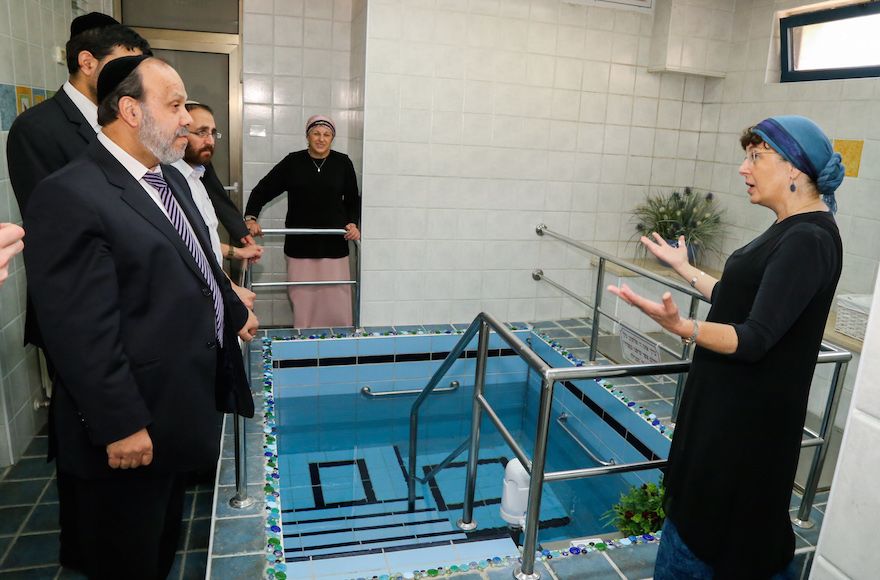(JTA) – In a landmark decision, Israel’s Supreme Court ruled that mikvahs in the country must open up to non-Orthodox conversion rites.
Until now, Israeli mikvahs have denied access for conversion immersions to Reform and Conservative converts. Israel’s mikvahs are run by Israel’s Religious Services Ministry, which operates in lock-step with the Orthodox-dominated Israeli Rabbinate.
Thursday’s ruling, based on a case brought in Beersheba, forces all Israel’s public mikvah ritual baths to allow access to groups wishing to perform non-Orthodox conversions.
The vice president of Israel’s Supreme Court, Elyakim Rubinstein, said the justices sought to reach a deal that would have given non-Orthodox converts access to three public mikvahs in various regions in Israel. But the Religious Services Ministry refused to compromise.
As a consequence, the ruling applies to all public mikvahs.
The court struck down all of the ministry’s arguments in favor of denying access, including the contention that mikvahs are open to all Jews and that these converts are not Jewish. Neither are Orthodox converts until they immerse, Rubinstein noted, concluding that the denial of access to those undergoing non-Orthodox conversions was unlawful.
“I think this is one of the most important constitutional rulings by the Supreme Court,” Gilad Kariv, the president of Israel’s Reform movement, told JTA. “This ruling really goes beyond the issue of immersion in the mikvah. The justices are saying that even if we have an Orthodox establishment, this establishment cannot impose any policy that goes against the basic democratic values of the state.”
READ: The rabbinate strikes back: 2015 in Israeli religious pluralism
Kariv said he believes the ruling will help the non-Orthodox movements score victories in other areas related to religious discrimination in Israel, such as lack of public funding for non-Orthodox streams of Judaism and restricted access to other public religious facilities by non-Orthodox Jews, clergy and institutions.
Until now, non-Orthodox conversion immersions were conducted in natural mikvahs – that is, the sea. For that reason, Kariv said, his movement has refused to convert children in the wintertime.
Hundreds of Israelis convert to Judaism under year under the aegis of the Reform and Conservative movements, according to Kariv. Though the converts are not considered Jewish by Israel’s Rabbinate and therefore have problems when it comes to marrying Jews, they are recognized as Jewish by Israel’s Population Registry.
Rabbi Rick Jacobs, the president of the Union for Reform Judaism, hailed the Supreme Court ruling.
“This is a breakthrough. Government-supported religious institutions must now, in a sense, move to a more pluralistic practice,” he said. “This changes some of the really difficult realities for non-Orthodox Jews and Judaism in Israel.”
Jacobs added that this fight exists in the United States, too. Most mikvahs in America are Orthodox-run and do not allow Reform or Conservative conversion immersions, according to Jacobs.
This was the second time in less than two weeks that the non-Orthodox movements in Israel scored a major victory. On Jan. 31, Israel’s government approved a compromise to expand the non-Orthodox Jewish prayer section of the Western Wall.
JTA has documented Jewish history in real-time for over a century. Keep our journalism strong by joining us in supporting independent, award-winning reporting.






